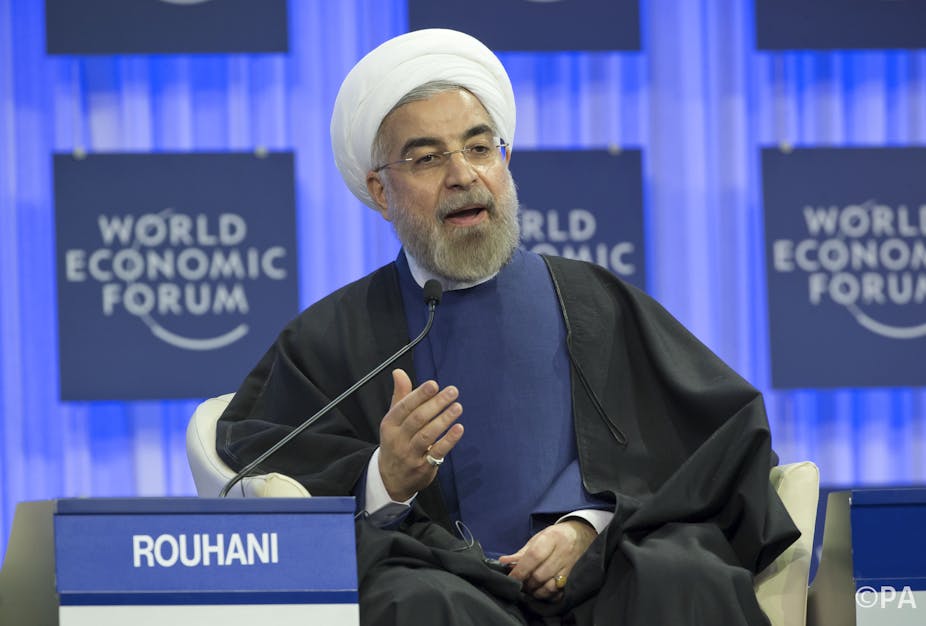Hassan Rouhani’s first European appearance did not disappoint, or veer far off script. The new Iranian president’s first trip as head of government to the continent had a somewhat predictable destination in Switzerland, the country that is today at the centre of much of the Islamic Republic’s diplomatic interests, from the nuclear negotiations with the 5+1 group to the future of Syria.
After descending from a plane curiously parked next to the Israeli government’s one at Zurich airport, Rouhani made his way to the snowy town of Davos, where he was the star attraction in the first full day of this year’s World Economic Forum. He brought with him a delegation that included his ever-present foreign minister, Javad Zarif (who rarely passes a fortnight without a trip abroad) and the oil minister, Bijan Namdar Zangeneh, who accompanied the president in an off-record, closed-doors meeting with top executives from international oil corporations such as ENI, Total and Royal Dutch Shell. This was followed by Rouhani’s speech in the main hall of the Davos forum complex.
Rouhani’s address, made during a spartan session which featured only himself and WEF founder Klaus Schwab, focused on the main themes of the initial phase of his presidency and remained remarkably succinct and practical, shying away from the grandstanding often espoused by his predecessor Mahmoud Ahmadinejad. True to the form exhibited thus far by his media savvy advisors, virtually the whole speech made it, in 140 character segments, to the president’s Twitter feed.
After reiterating his commitment to etedal, or moderation, and citing the Quranic roots of the concept, he proceeded to reiterate his government’s insistence on establishing friendly ties with long standing foes such as the United States. He praised the West’s attitude shift that allowed the Geneva agreement to be reached – and also once again refuted claims that Iran is intent on producing nuclear weapons. He concluded by inviting the audience to visit Iran and establish ties with both the state and private business communities, and to experience the country’s legendary hospitality first hand.
As occurred in his equally well-tempered speech at the UN in September, Rouhani refrained from adopting the incendiary rhetoric of his precedessor or raising controversial issues such as the Islamic Republic’s hitherto lively animosity towards Israel. He refused to be drawn on the diplomatic recognition of the Jewish state when prodded to do so by Schwab.
His core aim was therefore to reiterate that his presidency marks a decisive departure from the era of confrontation and tension under Ahmadinejad who, incidentally, never attended the Davos meeting. The idea that Iran is “open for business”, was the overarching theme and message of the Iranian president’s visit to the Alps.
Let’s be reasonable
Whether this message will reach its intended audience – the western (and mostly European) business executives who have congregated in Davos and who, according to Jack Straw, have started to fill planes flying to Tehran – depends on whether the long shadow of the Ahmadinejad years, and the political and financial isolation they brought to Iran, can be successfully shrugged off by the new administration.
Monday saw the start of the implementation of November’s Geneva agreement, with Iran gaining access to around half a billion of the hundreds of billions of dollars of oil revenue it has been unable to repatriate in recent years. Rouhani said Iran aspires to a final nuclear deal, but recognises it will be the conclusion of a long and tough negotiating process. This would pave the way for another aspiration revealed by the president in Davos: bringing Iran into the top ten economies of the world within three decades. This is a longstanding Iranian aim, but it has never seemed particularly close at hand.
Rouhani will still be received with scepticism from some quarters – particularly the Netanyahu government, which refuses to see his presidency as a significant departure from the Islamic Republic’s time-honoured aversion to Israel. Still, he appears to have added to the political capital he obtained in his previous visit to New York, confirming his role as a capable and credible interlocutor for the many government and diplomatic figures who met him on the sidelines at Davos.
It has been a long decade since a weary President Khatami addressed the Davos summit at the tail end of his presidential tenure, just before the turbulent Ahmadinejad era began. For many in Tehran, the sight of a new Iranian president treated with deference and openness at an international summit is a sign that the Islamic Republic can finally enter a lasting thaw in its often turbulent and never stable relationship with the west.

